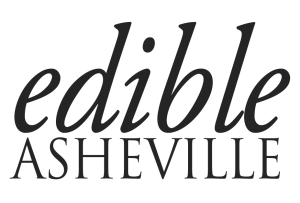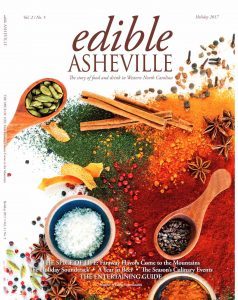HEALTH FROM THE HIVE
Local makers care for the body with honey-based products
BY BETH LASSITER | PHOTOS BY ERIN ADAMS
If you survived this year’s cold and flu season with countless cups of hot tea and honey, you know the latter’s almost magical powers. Now that spring is in the air, though, there are many other ways to use honey for well-being, inside and out.
Since antiquity, the by-products of bees have been used to speed healing, cure disease, and maintain wellness, from Egyptian wound treatments to Ayurvedic practices. Ancient Greeks, Assyrians, Chinese, and Romans also used honey as medicine and food. And studies now seem to point to honey’s efficacy in these realms. While it’s not recommended for infants under the age of one due to bacterial risks, older children and adults can all enjoy the sweetness of good health through honey products made right here in Western North Carolina.
A Taste of Jun
Shanti Volpe brings together the perspectives of Western and holistic medicine as she crafts the increasingly popular honey-based beverage known as Jun. As a child, she learned about traditional and natural remedies from her family. While working as a nurse and lactation consultant at Mission Hospital, she took a course in beekeeping and began running an apiary several years ago, in part because of her interest in the health benefits of honey. “I’ve always been interested in finding natural ways to heal and in using food as medicine,” she says.
Volpe considers honey to be a wonder food. Honey, she says, “is made up of natural sugars. It’s also made up of water, vitamins, minerals, pollen, and protein. So all of those things are preserved in raw honey. If you don’t heat the honey, you get all of those incredible health and nutritional benefits as well. Studies are even showing now that honey is the perfect carbohydrate to consume right before and right after exercising.”
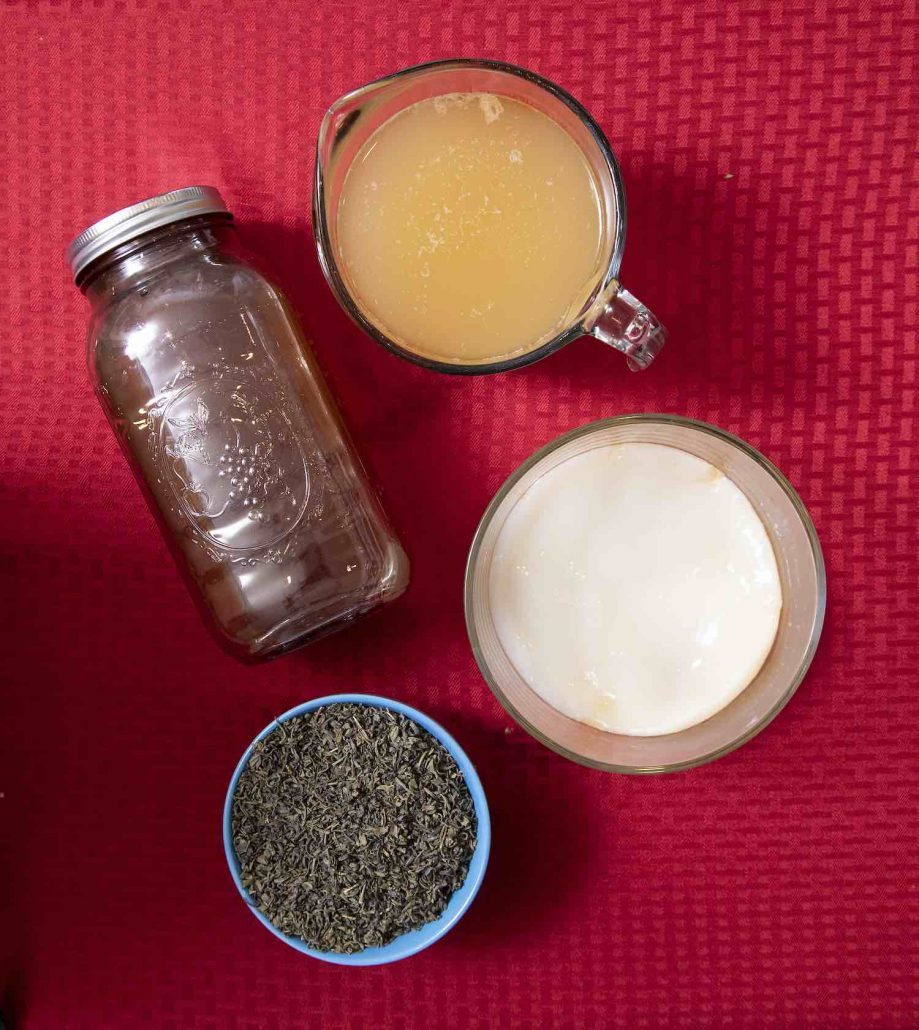
Shanti Elixirs makes the increasingly popular honey-based beverage known as Jun
A beekeeping instructor offered Volpe her first taste of Jun, a sparkling, fermented mixture of green tea and raw honey whose historical provenance is shrouded in mystery. What is known is that it hails from the Himalayan mountains and has been produced for generations. While it’s similar in some ways to kombucha, it’s made with green, not black, tea, and honey, not sugar. The SCOBY (symbiotic culture of bacteria and yeast) used to ferment the tea is different as well.
In addition to being smooth and lightly sweet, the drink combines the benefits of green tea, “which has powerful antioxidant properties,” with raw honey’s “antibacterial, antifungal, antioxidant, and anti-inflammatory properties,” says Volpe. She also notes that though the tea is brewed at a high temperature, the honey is only added when the tea has cooled to 100 degrees, thus preserving all the benefits associated with raw honey.
Volpe looks forward to expanding her offerings in the area, all with an eye to increased wellness for her customers. As the business grows, she plans to grow her apiary and hopes to open a venue in the city that offers nonalcoholic beverages that increase well-being and are also delicious, including her Jun. In the meantime, you can find it at stores across town as well as on tap at many local bars, where it is both incorporated into mixed drinks and served as a nonalcoholic alternative.
The Bee Whisperer
Other local entrepreneurs are also capitalizing on honey’s health benefits. Sarah McKinney, known to some in the area as “the bee whisperer,” has been keeping bees for more than a decade and runs 80 to 150 hives each year, some as an owner and some as the caretaker for others. She monitors the health of each hive throughout the year as well as harvesting. Along with Julie Jenson, she also runs Honey and the Hive in Weaverville, a shop that sells all things “bee”—from honeys and tinctures to the insects themselves. McKinney hosts and teaches workshops in the region and at the store, which has become the heart of a beekeeping and bee-loving community.
McKinney educates her customers and students about the health benefits of honey, and she says that local wildflower honey is particularly helpful for allergy relief as it contains local pollens. In addition to the pure honeys they sell, Honey and the Hive infuses honey with other ingredients that aim to increase their medicinal uses, including dried elderberries, an “immune booster,” mixed with echinacea, tulsi, and mint, and a “cold care” infusion with ginger, cinnamon, turmeric, red pepper and orange zest. What’s more, “it tastes like ginger snaps,” McKinney says. She encourages her students to create their own infusions, perhaps starting with elderberries, but she says that it’s crucial to use dried additions only, to keep the moisture level low and avoid fermentation.
McKinney tempers enthusiasm about other products of the hive with some caution. Products like royal jelly are often available only in tiny quantities and are therefore extremely difficult to harvest sustainably; products marketed as such may therefore have questionable provenance or be adulterated, she says. McKinney notes that people with inflammatory issues or autoimmune disorders have found success with bee venom, but this therapy should only be undertaken with a doctor’s supervision.
One product that is safe, easily accessible, and particularly powerful, she says, is propolis. “Propolis is an amazing substance that bees make from plant sap and use to seal and sanitize their hives. It also has strong anti-microbial, anti-fungal, and anti-inflammatory properties.” Its natural form is a sticky ball that is difficult and messy to work with. An employee of the store, Britta Baker, breaks the propolis down by freezing, grinding, and mixing it into a tincture—a process that takes months. McKinney suggests mixing a full dropper into honey or water and taking it orally to ward off a cold.
She also encourages customers to apply the tincture to small cuts or wounds to prevent infection and promote healing. “Its antioxidant and anti-inflammatory properties are great for skin generally,” she says. Volpe of Shanti Elixirs also values honey’s healing properties in topical uses. In her day job as a lactation consultant, she and her colleagues use medical- grade honey to protect broken skin from infection and speed healing.
Nature’s Moisturizer
“Honey is such an amazing ingredient,” says Christy Apodaca, owner of C&Co. Handcrafted Skincare in Asheville. “It’s a powerful humectant that draws atmospheric moisture into skin. It also has protective and healing properties when it is raw, which we harness in our formulations.”
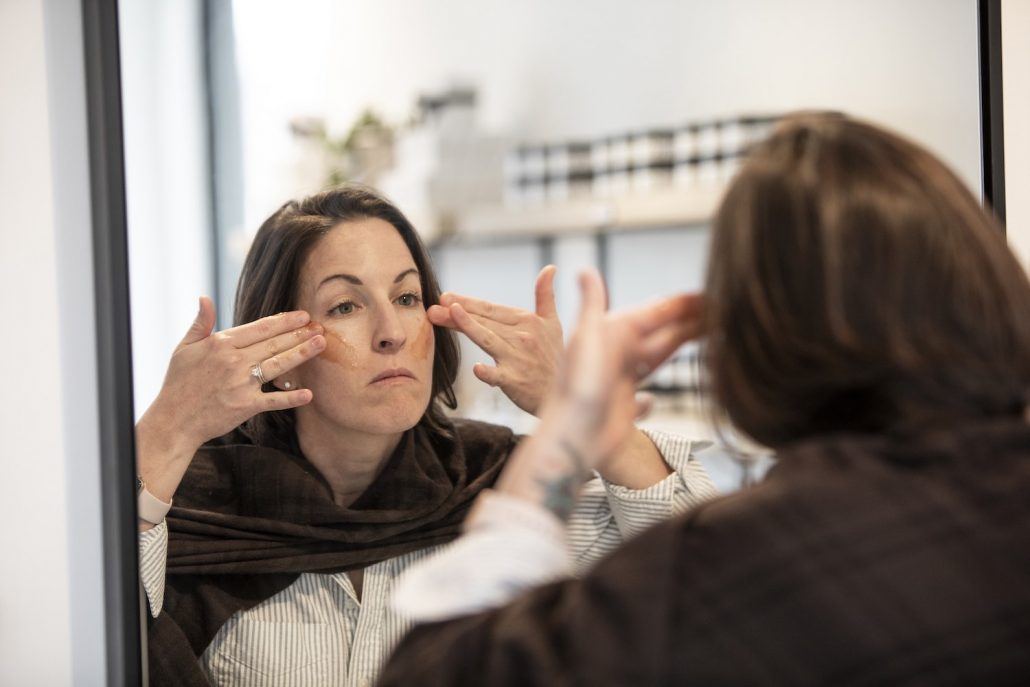
Apodaca calls honey an “amazing ingredient” for skincare
In her hometown of Tallahassee, Florida, Apodaca formulated her Daily Face Polish with the help of a beekeeping friend. It uses honey as a key ingredient, and she has now curated an entire line of products with certified all-natural ingredients that smell and feel delightful, with scents of peppermint, lavender, cedar, and sage.
For Apodaca, it’s all about the chemistry. Honey is slightly acidic, so when balanced and moderated in her formulation, it breaks the surface tension between dead skin cells and helps with healthy cellular turnover as it prepares the skin for other products like serums and moisturizers. Though her Daily Face Polish is her only product that features honey, it’s also her bestseller, and it’s used in all five facials offered at her new spa in Biltmore Village. It does require a little work—it must be stirred before applying to reincorporate and reactivate the ingredients.
Honey is not the only product of the hive that is beneficial, Apodaca says. Many of her products use beeswax, which “provides a barrier on skin to prevent transepidermal water loss without clogging pores,” she says. “It is also a natural anti-inflammatory for skin. We like to call this an ingredient win-win.” You’ll find beeswax doing its good work in her balms, salves, lip balms, moisturizer stick, carrot and rose eye repair, and lavender cold cream.
Scientists are currently studying other ways in which honey can be used as a treatment, inside and out, but there’s another health at stake in the use of natural remedies as well—the health of the ecosystem in which we live. Volpe, McKinney, and Apodaca are finding many customers in Western North Carolina who share their commitment to ingredients and products drawn from the natural world. As Volpe states in the mission of Shanti Elixirs, these entrepreneurs are “inspired by the honey bees and dedicated to nurturing the intimate con- nection between the health of our bodies and the well- being of our planet.” ◊◊
Beth Lassiter lives in West Asheville with her family. She hopes her newly planted orchard will attract bees throughout the season. During the writing of this piece, she drank countless mugs of tea drizzled with local honey, spoonfuls of honey eaten straight, and bottles of Jun to soothe her throat and quell her cough.
Save
Save
Save
Save
Save
Save
Save
Save
Save
Save
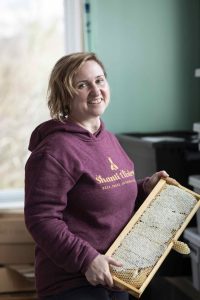
Shanti Volpe of Shanti Elixirs

Christy Apodaca, owner of C&Co. Handcrafted Skincare
THE WEEKLY REVEL
Sign up for your free handpicked guide to enjoying life around Asheville.
Available weekly from May to October.

